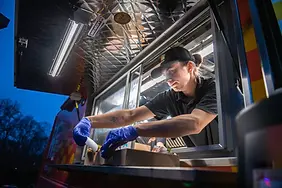[Free 2026 Guide] How to Start a Food Truck in North Carolina
One should identify strategic locations and events in North Carolina that attract a large crowd, ideal for a food truck business. Developing a menu that resonates with the culinary preferences of North Carolina's residents can significantly contribute to the success of a food truck. Consider the weather and seasonal factors in North Carolina when planning the operation schedule and menu for the food truck.


Insurance Coverage for Food Trailers in North Carolina
Insurance Coverage for Food Trailers in North Carolina
In North Carolina, food trailers with a Gross Vehicle Weight Rating (GVWR) of 3,000 lbs or more must be registered. The cost for a standard one-year trailer registration is $30.
To register, food truck owners need to provide a completed Vehicle Registration/Title Application (Form MVR-1), proof of ownership (bill of sale or title), proof of insurance, and a valid ID. Trailers under 3,000 lbs may qualify for a simplified process. Additionally, farm-use trailers are exempt from registration but must comply with safety requirements.
Food trailers in North Carolina must be insured separately from the towing vehicle, but the towing vehicle’s liability insurance typically extends to the trailer.
Minimum liability coverage for the trailer is $25,000 per person, $50,000 per accident for bodily injury, and $10,000 for property damage. It’s recommended to carry additional collision and comprehensive coverage to protect equipment.
Summarized Business Regulations for Cottage Food Laws in North Carolina
In North Carolina, a Cottage Food Operation refers to a small-scale food business run from a home kitchen, producing non-potentially hazardous foods for direct sale to consumers. These foods, such as baked goods, jams, and candies, must be made in compliance with specific labeling, training, and sanitation requirements outlined by the state's Department of Agriculture and Consumer Services. Cottage Food Operations are restricted in sales channels, typically selling directly to consumers at venues like farmers' markets, roadside stands, and online platforms.
Example of Successful Food Trucks in North Carolina

Sweet Southern Funk Food Truck
American food

Wutyasay Food Truck
Soul food

Crazy Taco Food Truck
Mexican food

How to Register and Title Your Food Truck in North Carolina [2026]
In North Carolina, food trailers with a Gross Vehicle Weight Rating (GVWR) of 3,000 lbs or more must be registered. The cost for a standard one-year trailer registration is $30.
To register, food truck owners need to provide a completed Vehicle Registration/Title Application (Form MVR-1), proof of ownership (bill of sale or title), proof of insurance, and a valid ID. Trailers under 3,000 lbs may qualify for a simplified process. Additionally, farm-use trailers are exempt from registration but must comply with safety requirements.

North Carolina Food Trailer Braking System Requirements
In North Carolina, food trailers with a GVWR over 3,000 lbs are required to have a braking system. Electric brakes are the most common and acceptable.
For trailers under 3,000 lbs, no independent braking system is necessary. If a trailer exceeds 10,000 lbs, it must have an independent braking system with a backup.
Lighting, Reflectors, and Safety Chains Requirements for Food Trailers in North Carolina
North Carolina requires food trailers to have two red tail lights visible from at least 500 feet and amber reflectors on each side. The trailer must also be equipped with functioning brake lights and turn signals. A safety chain, rated for the full GVWR of the trailer, must be attached to the hitch and the towing vehicle.

![Fast Track to Six-Figure Food Truck Profit in North Carolina [2026 Bundle with Guides, Calculators and Full Business Plan]](https://static.wixstatic.com/media/aec654_64c993a1b5a74b73b6f3f4f057eb5df3~mv2.jpg/v1/fill/w_562,h_375,al_c,q_80,usm_0.66_1.00_0.01,enc_avif,quality_auto/aec654_64c993a1b5a74b73b6f3f4f057eb5df3~mv2.jpg)





















